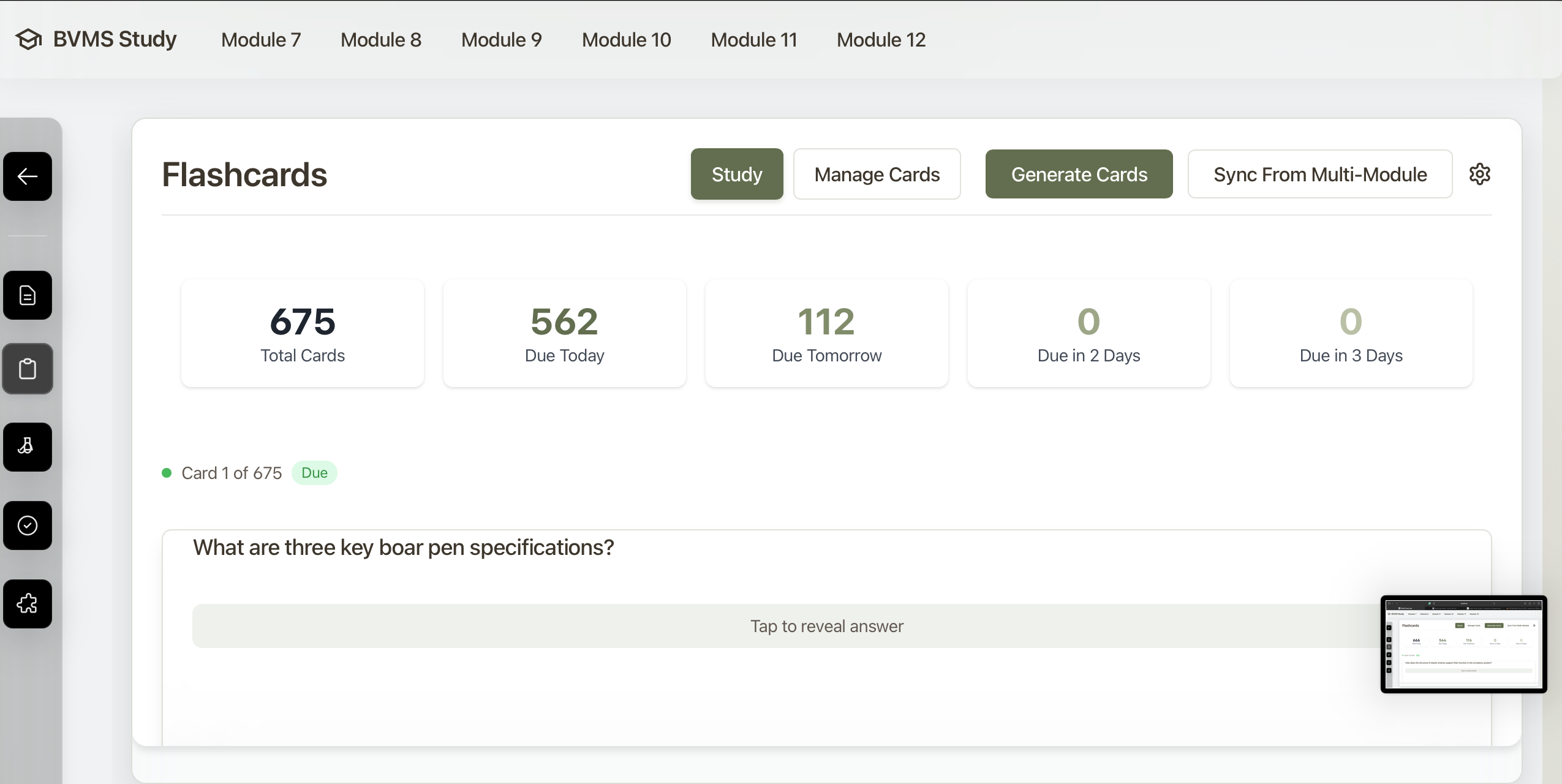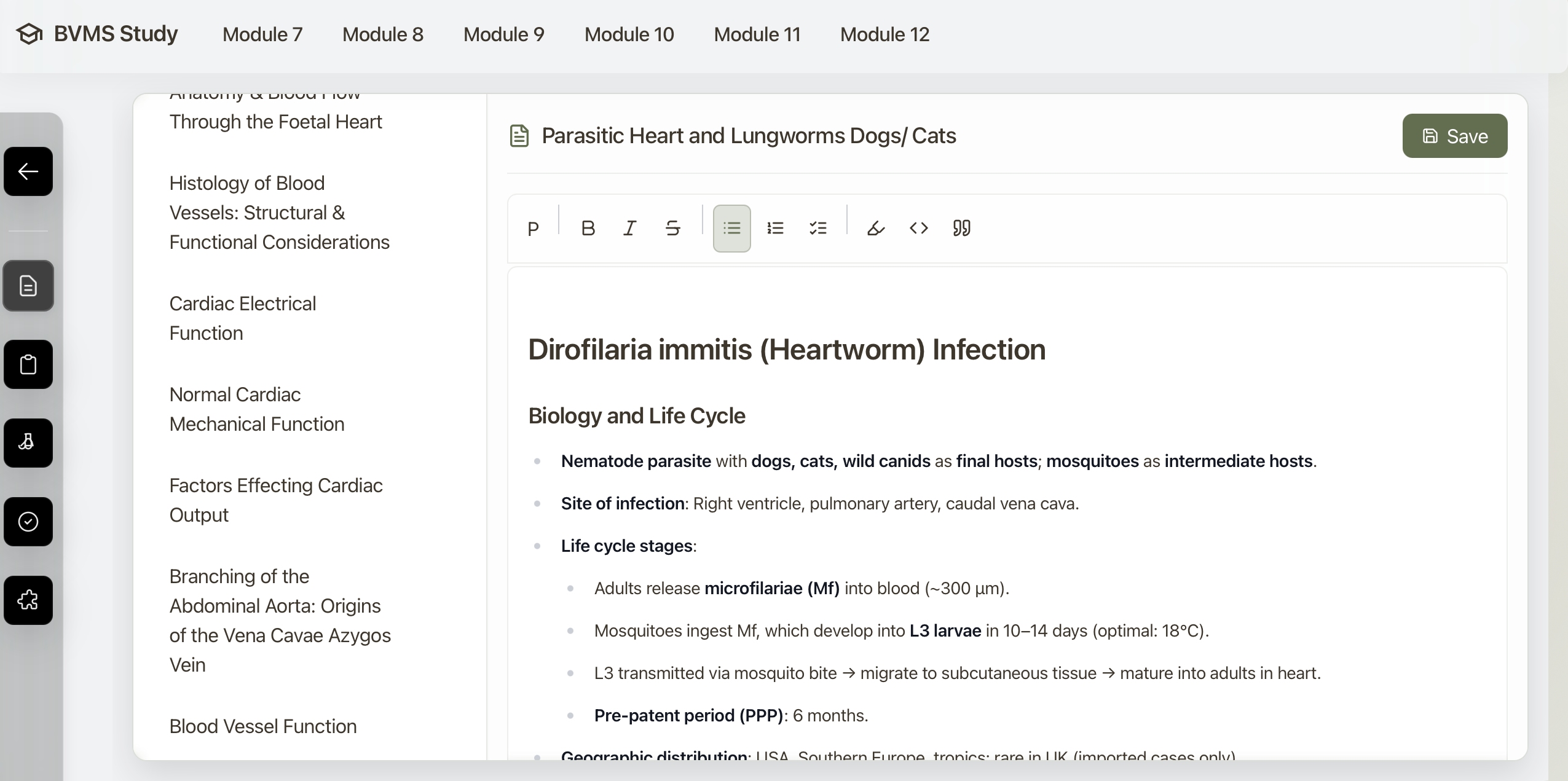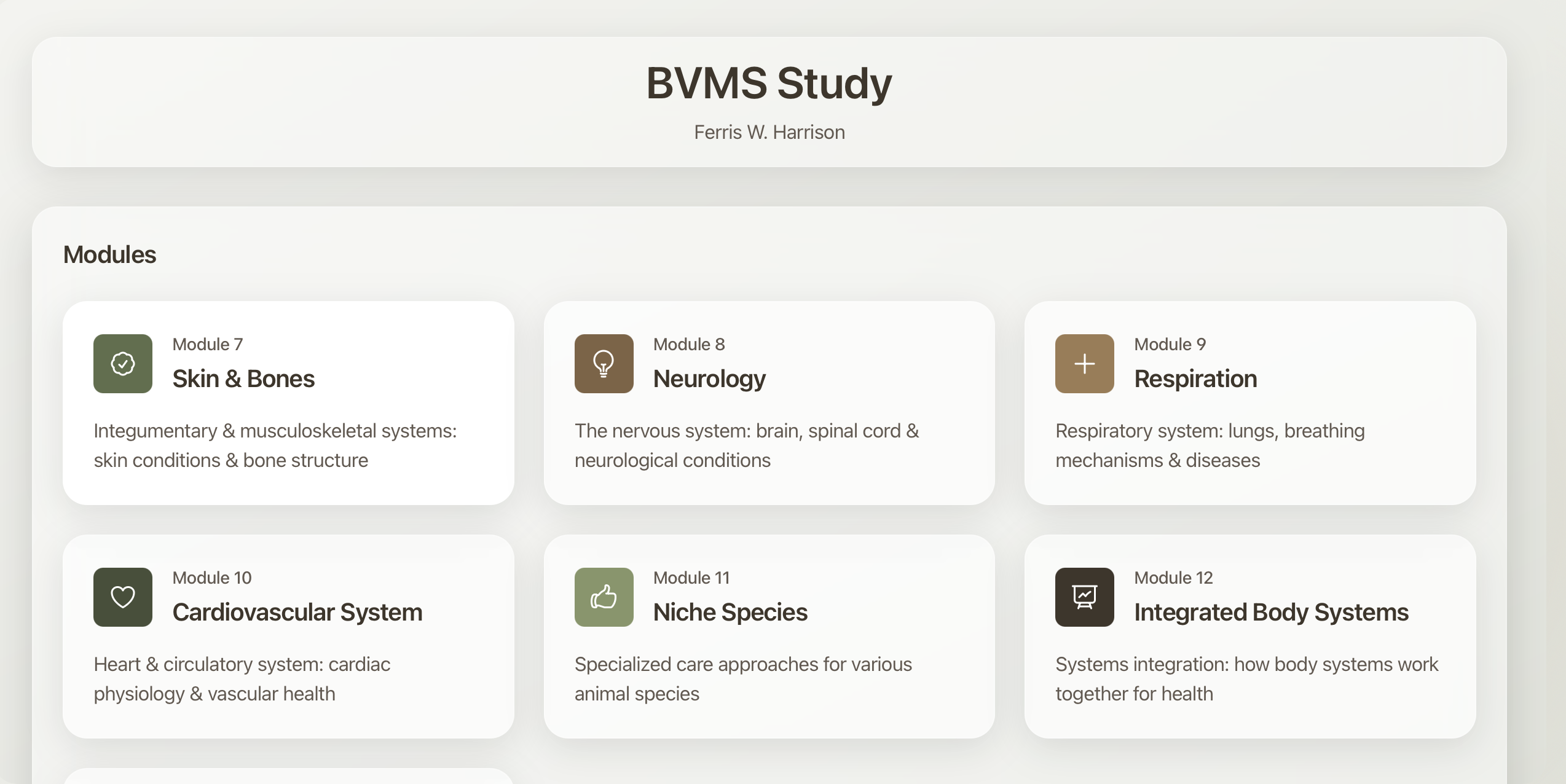Choice: Veterinary Study App
Brief Description
During BVMS2, I designed and built a custom study application to organize lecture content, generate active recall tools, and improve exam preparation. This tool includes note organization, flashcard creation with SM-2 spaced repetition, practice exams with automatic short-answer grading, study games, and several AI-driven features. The purpose of this app was to improve my preparedness for exams, which I felt was lacking following the first MCQ of the year.
Critical Reflection
At the beginning of the second semester of BVMS2, I faced significant challenges. Following our first multiple-choice examination, I felt completely overwhelmed and underprepared. Although confident in the material I had studied, the exam revealed substantial gaps due to critical content being inadvertently omitted from my study efforts. My plan lacked clear organization and was essentially improvised. I was left feeling crushed by the volume and complexity of the curriculum.
Recognizing the need for a structured and comprehensive approach, and seeing the current revolution in AI tools, I decided to create a personalized study application tailored to meet the specific demands of the veterinary program. My initial aim was straightforward, to centralize all my lecture content and ensure complete coverage of topics. However, through incremental improvements, the application evolved into an integrated academic app featuring organized note management, flashcard generation using an optimized spaced repetition system based on current research (Tabibian et al., 2019), practice exams with automated grading for short-answer questions, and interactive study games. It also includes multiple AI-driven features, allowing for targeted reinforcement to address gaps in my knowledge base.
The app leverages spaced repetition, a technique proven to enhance long-term retention. Initially, I implemented the widely used SM-2 algorithm. However, seeking further optimization during the course of this portfolio's preparation, I incorporated principles from recent research aimed at enhancing human learning via scheduling optimization (Tabibian et al., 2019) and updated the flashcard system accordingly. While the refined algorithm itself is newly implemented, the overall impact of using a structured, evidence-based study app has been profound. My exam preparedness feels significantly improved. While I can't be sure of its effect until I've taken the exams, my confidence in the material has skyrocketed. Additionally, because of this new backbone to my routine, my stress levels noticeably decreased, further improving my ability to thrive in the program.
While this app has already been tremendous for me, I have several improvements I'd like to make over the summer. Integrating the app with my calendar would provide seamless synchronization between academic schedules, study plans, and other commitments. This will allow me to receive a detailed, AI-generated, daily schedule when I wake up every morning. Also introducing daily "morning games," similar in style to the New York Times games, covering cumulative content across the BVMS course would help maintain a broader knowledge base and reinforce long-term retention. Furthermore, I still need to improve module-specific games that could enhance learning effectiveness by making revision more interactive and enjoyable. A particularly ambitious feature I aim to implement is an advanced AI system capable of proactively identifying and highlighting specific areas of weakness based on my performance data across modules, further optimizing my study efficiency. While initially a personal project, there is also potential for collaborative features that allow sharing and joint study sessions with peers, creating a community-focused learning environment.
I also plan to retrospectively integrate all content from BVMS1 and ensure the ongoing incorporation of material through the conclusion of the veterinary program. Eventually, I envision this tool becoming my "second brain" in clinical practice, providing quick access to consolidated, personalized veterinary knowledge and enhancing my professional capabilities.
Creating this study application has not only improved my academic outcomes but has deeply enriched my understanding of effective learning strategies. It reinforced essential professional values such as self-awareness, proactive problem-solving, and continuous self-improvement, qualities integral to veterinary professionalism. Ultimately, this experience transformed an initial academic setback into a powerful catalyst for personal and professional growth, highlighting the critical role of reflection and innovation in shaping my veterinary journey.
(594 words)Outcome Annotations
This project contributed to my development in the following Foundation Phase Outcomes:
Annotations
Communication
I have translated complex veterinary concepts into clear digital content (notes, flashcards) within the app. I have designed visual representations and interactive elements (games, quizzes) to communicate information effectively for learning and revision.
Research / Evidence Based Veterinary Medicine
I have applied cognitive science principles by implementing an optimized spaced repetition system based on current research (Tabibian et al., 2019). I have ensured content accuracy within the app by referencing peer-reviewed literature and standard veterinary texts during content creation.
Professional Attitude
I have demonstrated initiative and commitment to self-improvement by developing this technological solution to address learning challenges. I have engaged in proactive problem-solving and shown creativity in designing features to enhance personal and potentially peer learning.
Supporting Materials & References
App Interface Screenshots



References
- Tabibian, B., Upadhyay, U., De, A., Zarezade, A., Schölkopf, B., & Gomez-Rodriguez, M. (2019). Enhancing human learning via spaced repetition optimization. Proceedings of the National Academy of Sciences, 116(10), 3988-3993.